Stephen Frears: New Ali film 'isn't about Muhammad Ali'
- Published
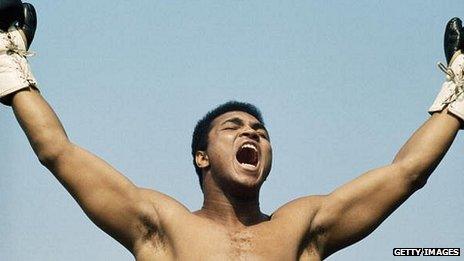
Ali's refusal to be drafted into the US army cost him his heavyweight belt and his boxing license
British director Stephen Frears is flying the flag for British feature films at this year's Cannes Film Festival.
The twice Oscar-nominated filmmaker's latest project, Muhammad Ali's Greatest Fight, which is being screened out of competition, is the only feature-length film by a major UK director at this year's event.
But he is far from the first film to look at the life of one of the 20th Century's great sporting icons.
Ali played himself in The Greatest, an adaptation of his autobiography; his battle with George Foreman in Zaire was turned into the Oscar-winning documentary When We Were Kings, and Will Smith turned in another award-nominated turn in Michael Mann's film Ali.
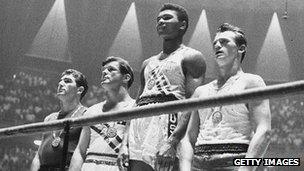
Ali said he threw his Olympic medal in the river after being asked to leave a 'whites-only' diner
Frears's film focuses on the boxer's refusal, in 1967, to be conscripted into the US military, based on his religious beliefs and his opposition to the war in Vietnam.
"It's not really about Muhammad Ali," explains Frears, while seated at his kitchen table in his home in west London.
"It's only about him incidentally. It's really about the US Supreme Court, which no-one has ever made a film about, and at the time we show them they were dealing with his case, and nobody really knows this story."
Title stripped
Ali, the beautiful and brash fighter who was already viewed with suspicion by many Americans after changing his name from Cassius Clay when he joined black separatists the Nation of Islam, was arrested and found guilty on draft evasion charges and sentenced to five years in prison.
At the peak of his career, he was stripped of his world heavyweight title and his boxing licence was suspended. He did not serve time in prison but did not fight again for nearly four years while his appeal worked its way up to the Supreme Court.
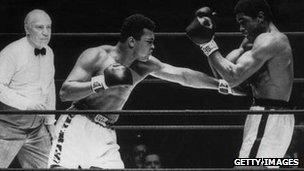
Ali fought Ernie Terrell just months before his ban
"I understood that taking his title away was near criminal, that preventing him from earning a living was criminal, in the end justice was done," says Frears.
Sonoma State University lecturer and Ali expert Mike Ezra agrees: "No-one had more to lose than Ali, you don't get long at a boxing career.
"From age 25 until 28 - his prime years - he lost what would be now hundreds of millions of dollars with no guarantee of ever getting it back, plus he drained his entire savings on his legal battle.
"So, for Ali to give that up on a principle, people respected that."
Though Ali's anti-war stance came during the height of the civil rights movement in the US and he often addressed the issue of racism in interviews, Frears insists Ali was not particularly motivated by politics.
"He wasn't really engaged in the civil rights movement oddly enough," he says. "There's not a lot of talk about Martin Luther King - who was was around at the same time.
"I don't know that he was a particularly political figure at the time - all he wanted to do was get back to earning a living, so he wasn't making himself into a troublemaker at all."
However Mr Ezra, whose book Muhammad Ali: The Making of an Icon examines his career and his legacy, disagrees: "He was much more engaged with the movement than the Nation of Islam would allow.
"He met with King in 1967 and although he said things in interviews about the civil rights movement, that it wasn't the most effective way to battle racism, he was of great importance to civil rights leaders and he was always willing to meet with them."
The film stars Christopher Plummer, Danny Glover and Frank Langella, but no actor has been cast as the champion boxer, instead Ali appears only in archive footage. Was that a conscious decision?
"No, it was common sense," argues Frears. "If you cast an actor as Muhammad Ali then all people will talk about is whether he was any good or not or whether he resembled Ali.
"The idea that Ali was all in archive, well I don't know if I've ever seen that in film before. If it had to be an actor, I wouldn't have started."
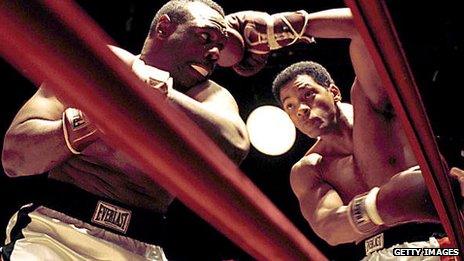
Will Smith was nominated for a best actor Oscar when he played Ali in a 2001 film
'Totally different'
With so much already known about the boxer and with many people already holding opinions of the man and his politics, Frears says he is aware that by tackling a particular period in his life, he is putting his "head in the lion's mouth".
"I'm very aware that there were people who were very close to him so you have to get things right and people will say 'No it wasn't like that,' so you have make an effort and concentrate on getting things right."
But, he adds, the Muhammad Ali institute in his hometown of Louisville had offered support, its representatives telling him "we can't believe it, you came up with a story that's totally different".
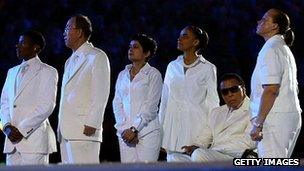
Ali was a flag bearer at the London 2012 Games
Mr Ezra adds: "I think over the long term, and Ali hardening into the legend he's become, he was on the proper side of history.
"Nowadays most Americans think Vietnam was a big mistake and for Ali to anticipate that was remarkable."
In 1984, Ali was diagnosed with Parkinson's disease and now, aged 71, the retired boxer is frail - largely confined to a chair during the opening ceremonies of the 2012 Olympics in London, where he was a flag bearer for the sporting event.
Frears recalls meeting him: "I was in a room with him, which was profoundly upsetting because he's in such a terrible state."
Frears's film has been made for US cable service HBO - which has another film screening in competition at Cannes.
Behind the Candelabra is a biopic of the flamboyant pianist Liberace, starring Michael Douglas and Matt Damon.
Frears says one of the perks of working with HBO is "not having to worry about an opening weekend".
"The other day, I was in America and I showed it to Christopher Plummer," Frears recalls. "I thought, 'That's it, I'm finished with this film now. I don't have to sell the film'.
"I salute HBO for doing such good work, no studio would have made this film. The good writing is now being done in television.
"Go where the good work is. That's what I do."